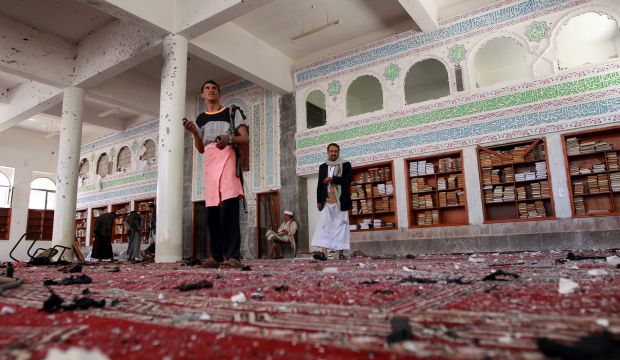
Yemeni armed men inspect the damage following a bomb explosion at the Badr mosque in southern Sana’a on March 20, 2015. (AFP/Mohammed Huwais)
Sana’a, Asharq Al-Awsat—There has been strong regional and international condemnation of one of the deadliest terrorist attacks in Yemen’s history that resulted in the deaths of at least 137 people in Sana’a on Friday.
A Yemeni branch of the Islamic State of Iraq and Syria (ISIS) claimed responsibility for Friday’s attacks on two mosques in the capital, with Yemeni President Abd Rabbuh Mansur Hadi warning that the sectarian nature of the attack aimed to drag the Yemeni state into “chaos, violence and civil war.”
In an open letter issued to the families of the victims of Friday’s attack, embattled President Hadi—who is currently based out of the southern port city of Aden—condemned the attacks as “terrorist, criminal and cowardly.”
“Shi’ite extremism, represented by the armed Houthi militia, and Sunni extremism, represented by Al-Qaeda, are two sides of the same coin; neither side want stability for Yemen and its people,” Hadi warned.
Although initial reports speculated that Al-Qaeda had been responsible for the attack, ISIS formally claimed responsibility for the suicide bombings late Friday. A group claiming to be a Yemeni ISIS-affiliate posted an online statement claiming responsibility for the suicide attacks, but the statement could not be verified.
The White House said that there is no indication that ISIS was behind the operation, adding that the US is looking to see whether ISIS has a command-and-control structure that would enable it to coordinate an attack of this size in Yemen.
Four suicide bombers reportedly attacked the Badr mosque in southern Sana’a and the Al-Hashoosh mosque in northern Sana’a as worshipers gathered for Friday prayers. The mosques predominately cater to Shi’ite worshipers, particularly members of the Zaydi Houthi group that has taken over de facto control of the Yemeni capital.
Al-Qaeda in the Arabian Peninsula (AQAP) has a strong presence in some parts of the country and has escalated its attacks against the country’s Shi’ite community following the Houthi takeover of Sana’a. Al-Qaeda and ISIS remain at odds over doctrinal and ideological issues. AQAP denied responsibility for the attacks on Friday.
White House spokesman Josh Earnest said ISIS often claims responsibility for attacks purely for propaganda value. “It does appear that these kinds of claims are often made for a perception that it benefits their propaganda efforts,” he told reporters.
Riyadh offered to send medical assistance to Yemen to help deal with the fallout from the attack. The latest figures confirm that 137 people were killed and that at least 350 people were wounded.
“The Kingdom of Saudi Arabia rejects these terrorist aggressions which will only lead to more destabilization of security and stability in Yemen,” an official statement carried by the Saudi Press Agency (SPA) said on Friday.
“The Kingdom of Saudi Arabia confirms that it is standing by the side of legitimacy and the Yemeni people, by all means,” the statement added.
The Gulf Cooperation Council (GCC), which is in the process of seeking to resolve the ongoing political stalemate between President Hadi and the Houthis, also strongly condemned Friday’s attack, warning that this will only lead to more instability.
GCC Secretary-General Abdullatif Al-Zayani warned that Friday’s attacks aim to “throw Yemen into a cycle of continuing conflicts and infighting.” He called on Yemen’s political parties to back the GCC bid to resolve the political crisis in the country.
Zayani renewed calls for all of Yemen’s political parties to attend a forthcoming GCC-backed conference in Riyadh to resolve the political crisis, including the Houthis.
